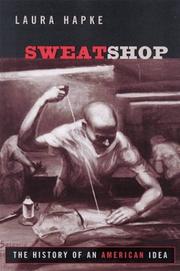| Listing 1 - 10 of 22 | << page >> |
Sort by
|

ISBN: 1136063943 020361674X 0415935601 9781136063947 9780203616741 9780415935609 9780415935616 041593561X 9781136064029 9781136064104 1136064028 Year: 2003 Publisher: New York
Abstract | Keywords | Export | Availability | Bookmark
 Loading...
Loading...Choose an application
- Reference Manager
- EndNote
- RefWorks (Direct export to RefWorks)
Sweatshops --- History. --- Sweat shops --- Sweated industries --- Sweating system --- Factories --- Anti-sweatshop movement
Book
ISBN: 9781409458050 Year: 2014 Publisher: Farnham : Ashgate,
Abstract | Keywords | Export | Availability | Bookmark
 Loading...
Loading...Choose an application
- Reference Manager
- EndNote
- RefWorks (Direct export to RefWorks)
Clothing trade --- Anti-sweatshop movement --- Consumer behavior --- Moral and ethical aspects
Book
ISBN: 1849643911 9781849643917 9780745327693 0745327699 9780745327686 0745327680 Year: 2009 Publisher: London New York Pluto Press Distributed in the U.S.A. by Palgrave Macmillan
Abstract | Keywords | Export | Availability | Bookmark
 Loading...
Loading...Choose an application
- Reference Manager
- EndNote
- RefWorks (Direct export to RefWorks)
"The Clean Clothes Campaign is a worldwide movement that aims to improve the wages and conditions of sweatshop workers. This is the story of their struggle. Large retailers such as Tesco, Walmart and Carrefour lure shoppers in with prices that seem too good to be true. This book shows that they're too good to be fair. All along the industry's supply chain, workers, often children, are exploited through poverty wages, unpaid overtime and harsh anti-union measures. The campaign urges those in charge of the garment industry's supply lines to protect their workers and treat them fairly. This dynamic account of direct engagement by concerned consumers is a must read for those that see globalization differently and want their shopping choices to support the most vulnerable people involved in the clothing industry"--Publisher description.
Sweatshops. --- Anti-sweatshop movement. --- Clothing trade --- Clothing workers. --- Moral and ethical aspects. --- Ontwikkelingslanden.
Book
ISBN: 9780745327693 Year: 2009 Publisher: London Pluto Press
Abstract | Keywords | Export | Availability | Bookmark
 Loading...
Loading...Choose an application
- Reference Manager
- EndNote
- RefWorks (Direct export to RefWorks)
Anti-sweatshop movement --- Clothing trade --- Clothing workers --- Sweatshops --- Moral and ethical aspects

ISBN: 0813534666 9786613904478 0813542561 1283592029 081353710X 9780813537108 9780813534664 0813534674 9780813534671 9780813542560 9781283592024 6613904473 Year: 2004 Publisher: New Brunswick, NJ
Abstract | Keywords | Export | Availability | Bookmark
 Loading...
Loading...Choose an application
- Reference Manager
- EndNote
- RefWorks (Direct export to RefWorks)
Arguing that the sweatshop is as American as apple pie, Laura Hapke surveys over a century and a half of the language, verbal and pictorial, in which the sweatshop has been imagined and its stories told. Not seeking a formal definition of the sort that policymakers are concerned with, nor intending to provide a strict historical chronology, this unique book shows, rather, how the “real” sweatshop has become intertwined with the “invented” sweatshop of our national imagination, and how this mixture of rhetoric and myth has endowed American sweatshops with rich and complex cultural meaning. Hapke uncovers a wide variety of tales and images that writers, artists, social scientists, reformers, and workers themselves have told about “the shop.” Adding an important perspective to historical and economic approaches, Sweatshop draws on sources from antebellum journalism, Progressive era surveys, modern movies, and anti-sweatshop websites. Illustrated chapters detail how the shop has been a facilitator of assimilation, a promoter of upward mobility, the epitome of exploitation, a site of ethnic memory, a venue for political protest, and an expression of twentieth-century managerial narratives. An important contribution to the real and imagined history of garment industry exploitation, this book provides a valuable new context for understanding contemporary sweatshops that now represent the worst expression of an unregulated global economy.
Sweatshops -- United States -- History. --- Sweatshops --- History. --- Sweat shops --- Sweated industries --- Sweating system --- Factories --- Anti-sweatshop movement --- History --- E-books
Book
ISBN: 0678007551 Year: 1971 Publisher: New York Kelley
Abstract | Keywords | Export | Availability | Bookmark
 Loading...
Loading...Choose an application
- Reference Manager
- EndNote
- RefWorks (Direct export to RefWorks)
Poor --- Sweatshops --- Working class --- Sweat shops --- Sweated industries --- Sweating system --- Factories --- Anti-sweatshop movement --- Social problems --- Economic sociology --- National wealth
Book
ISBN: 9781107688933 9781139342704 9781107029903 Year: 2014 Publisher: Cambridge Cambridge University Press
Abstract | Keywords | Export | Availability | Bookmark
 Loading...
Loading...Choose an application
- Reference Manager
- EndNote
- RefWorks (Direct export to RefWorks)
Book
ISBN: 1439918236 Year: 2020 Publisher: Philadelphia, Pennsylvania ; Rome ; Tokyo : Temple University Press,
Abstract | Keywords | Export | Availability | Bookmark
 Loading...
Loading...Choose an application
- Reference Manager
- EndNote
- RefWorks (Direct export to RefWorks)
"Tells the story of how the student anti-sweatshop movement on US college campuses was able to coordinate a massive change in strategy in response to new labor tactics undertaken by target garment industry corporations. Demonstrates that a decentralized movement can coordinate in response to changing opportunities"--
Anti-sweatshop movement --- Student movements --- College students --- Sweatshops. --- Clothing trade. --- Employee rights. --- Social justice. --- Political activity --- United Students Against Sweatshops.
Book
ISBN: 0816654115 Year: 2007 Publisher: Minneapolis : University of Minnesota Press,
Abstract | Keywords | Export | Availability | Bookmark
 Loading...
Loading...Choose an application
- Reference Manager
- EndNote
- RefWorks (Direct export to RefWorks)
Unraveling the Garment Industry investigates the politics of labor and protest within the garment industry. Focusing on three labor rights movementsÑagainst GAP clothing in El Salvador, child labor in Bangladesh, and sweatshops in New York CityÑEthel C. Brooks examines how transnational consumer protest campaigns effect change, sometimes with unplanned penalties for those they intend to protect.
Anti-sweatshop movement. --- Protest movements --- Women --- Working class women. --- Social conflict. --- International cooperation. --- Social conditions. --- Economic conditions.
Book
ISBN: 0812294319 0812249399 Year: 2017 Publisher: Philadelphia : University of Pennsylvania Press,
Abstract | Keywords | Export | Availability | Bookmark
 Loading...
Loading...Choose an application
- Reference Manager
- EndNote
- RefWorks (Direct export to RefWorks)
The 2013 collapse of Rana Plaza, an eight-story garment factory in Savar, Bangladesh, killed over a thousand workers and injured hundreds more. This disaster exposed the brutal labor conditions of the global garment industry and revealed its failures as a competitive and self-regulating industry. Over the past thirty years, corporations have widely adopted labor codes on health and safety, yet too often in their working lives, garment workers across the globe encounter death, work-related injuries, and unhealthy factory environments. Disasters such as Rana Plaza notwithstanding, garment workers routinely work under conditions that not only escape public notice but also undermine workers' long-term physical health, mental well-being, and the very sustainability of their employment.Unmaking the Global Sweatshop gathers the work of leading anthropologists and ethnographers studying the global garment industry to examine the relationship between the politics of labor and initiatives to protect workers' health and safety. Contributors analyze both the labor processes required of garment workers as well as the global dynamics of outsourcing and subcontracting that produce such demands on workers' health. The accounts contained in Unmaking the Global Sweatshop trace the histories of labor standards for garment workers in the global South; explore recent partnerships between corporate, state, and civil society actors in pursuit of accountable corporate governance; analyze a breadth of initiatives that seek to improve workers' health standards, from ethical trade projects to human rights movements; and focus on the ways in which risk, health, and safety might be differently conceptualized and regulated. Unmaking the Global Sweatshop argues for an expansive understanding of garment workers' lived experiences that recognizes the politics of labor, human rights, the privatization and individualization of health-related responsibilities as well as the complexity of health and well-being.Contributors: Mark Anner, Hasan Ashraf, Jennifer Bair, Jeremy Blasi, Geert De Neve, Saydia Gulrukh, Ingrid Hagen-Keith, Sandya Hewamanne, Caitrin Lynch, Alessandra Mezzadri, Patrick Neveling, Florence Palpacuer, Rebecca Prentice, Kanchana N. Ruwanpura, Nazneen Shifa, Dina M. Siddiqi, Mahmudul H. Sumon.
Clothing workers --- Sweatshops. --- Sweat shops --- Sweated industries --- Sweating system --- Factories --- Anti-sweatshop movement --- Clothing trade --- Garment workers --- Employees --- Health and hygiene.
| Listing 1 - 10 of 22 | << page >> |
Sort by
|

 Search
Search Feedback
Feedback About UniCat
About UniCat  Help
Help News
News